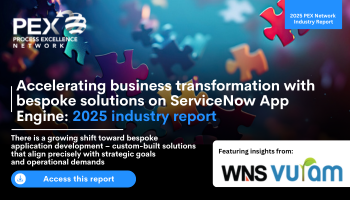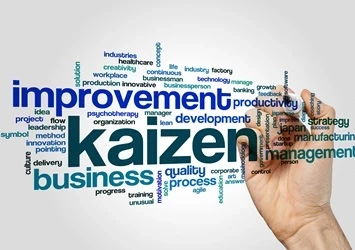5 hot takes on process excellence, AI and big data
Discover the hot takes from important conversations on digital transformation, process excellence and AI
Add bookmark
Recently, the PEX Network community was privy to a number of hot takes related to top trends in process excellence including big data, artificial intelligence (AI) and governance. Consider these interesting perspectives from practitioners, thought leaders and influencers shared during a number of webinars delivered by the PEX Network.
Join the PEX Network community

Don't miss any news, updates or insider tips from PEX Network by getting them delivered to your inbox. Sign up to our newsletter and join our community of experts.
Learn More1. Data is king – unless it isn't
Organizations swim in a sea of data nowadays. Advanced technology has made data ubiquitous – and overwhelming. Simplifying, translating and knowing how to leverage the data available to an organization is part art and part skill. In recent PEX Network webinars, thought leaders shared that data is only as good as the people curating it. Without certain guardrails and expertise, the data might not be much of a benefit to anyone.
"If the data is not good, your answer is not going to be good either," said Ivan Branco, head of information management, business intelligence and analytics at Volvo GTO SML. To be successful, leaders must obtain the highest quality data possible, check the security of information modeling and employ the necessary workforce, Branco said.
In fact, Ruslan Sultanov, product marketing manager at Precisely, reminded the audience that untrustworthy data costs more to clean up and fix errors. It also stalls projects. One solution for taking data to the next level is data enrichment, said the participants in a webinar on supercharging AI with data enrichment, sponsored by Precisely. Data enrichment is the process of combinning first party data from internal sources with data from internal systems or third party data.
WATCH: From noise to brilliance: Supercharge AI with data enrichment
2. Governance is an accelerator
Yes, that subhead is correct, and it may be the hottest take on PEX trends. While many see governance and compliance as a hindrance to their work and ambitions, the truth is that meeting these required standards can help (rather than hurt) a company.
"Organizations have a tendency to look at data governance or data management as an impediment or a level of overhead," said JD Donnelly, senior director, professional services at Precisely. "In reality, it's a catalyst for organizations to go faster."
WATCH: Ahead of the curve in data governance & analytics: Driving data value at Northwest Bank
3. The fear of AI will break people
Leveraging AI in process excellence is not a new concept. While ChatGPT and others put generative AI on the map more recently, automation with AI has been around for many years. Yet, some people are still afraid just to hear the name of this technology. They worry humans will be replaced, the human touch will be lost and the robots will take over.
"One important thing when applying AI is that you need to make sure that people understand both the limitation and the opportunities," says Dr. Djamila Amimer, founder of Mind Senses Global and Top AI Voice on LinkedIn. "We're not talking about replacing human capabilities. We're really talking about augmenting human capabilities. It goes hand in hand with the workforce."
Still, people must have eyes wide open. While Amimer is right about the fact that "AI will make continuous improvement faster and better," there are some limitations, at least presently.
"When you're working with a trained model, your responses are really limited to the data that the model is trained on," said Tyler Dunn, sales engineer at Precisely. "Unless you're working with that model right out of the box and it's a day or two or a week after it's been trained, the data is already antiquated."
WATCH: Accelerate financial returns by harnessing AI and a high-performance culture
4. Bad people strategies result in bad processes
Many fail to realize the true importance of talent when applying a process excellence agenda. Perhaps, people matter most of all. They can determine the success of initiatives. One of the best ways to reach employees and ensure they're on board with harnessing AI, data or anything else is by giving them a sense of purpose.
"Show them what they do specifically links to that big picture; getting them to fight for the cause is much easier in the sectors I work in as it usually means creating a strong link to something great like curing cancer," said Gurdeep Gahir, director, Ad-Esse Consulting. "It's really easy to buy into that cause. I think it's harder in other sectors, but I think the lack of that link to the purpose means that you have people who are just there to do a job. Then, it's more difficult to create a proper connection and drive improvement."
5. Leaders are mostly in the dark
Employees are only going to support continuous improvement if they receive the right message about it from leadership. Another sizzling hot take from the week's webinars was that most leaders have no idea what's happening on the ground or how employees are experiencing work. This gap in knowledge can be debilitating.
"Leaders tend to be disengaged from improvement," said Nick Racster, founder and CEO at KaizApp AG. "What this means is that they tend not to be leading it from the front in the way that we need them to. One of the biggest reasons in the West is leaders need to see financial impact."
Indeed, the problem might be bigger than most realize.
"The iceberg of ignorance [exists]. Many of you are familiar with this," said Frazer Mackay, manufacturing director at Nanopore Technologies. "In the C-suite, we're probably only aware of around 3 to 4 percent of the actual issues. I think it's very important to understand that they probably don't care about the other 96 percent, but it's important to understand it well. We've got a CI culture and the more people we've got engaged, the better."
Instead, business and thought leaders suggest leaders flip things around and begin paying attention to what their workers are experiencing.
"It's the role of the executives to be looking at things that you're not looking at and pushing to have things happen a lot sooner than they should. That's part of their role, but that creates a challenge," said Todd Henley, VP chief data governance and privacy Officer at Northwest Bank. "You'll hear executives say, 'Well, we've been talking about this for years.' And it's like, 'Well, I hate to tell you but data quality problems are going to exist no matter how long the organization exists.' That's just the reality. It's not a project. It's a program and you're going to adopt that mindset. It takes time to build these things."
Accelerating business transformation with bespoke solutions on ServiceNow App Engine

Today, off-the-shelf software solutions offer diverse features that enable vast opportunities to implement and maintain business transformation. However, in some circumstances, capabilities lack the flexibility and specificity required to address the unique challenges and workflows of individual organizations. As a result, there is a growing shift toward bespoke application development – custom-built solutions that align precisely with strategic goals and operational demands.
Download this report to explore how enterprises can harness the power of custom applications to drive meaningful transformation. With the growing adoption of low-code platforms like ServiceNow App Engine, organizations are building custom applications faster and with greater control. By empowering both IT professionals and citizen developers to build tailored solutions, organizations can significantly reduce time to value while maintaining control over quality and compliance.
Download Now
























